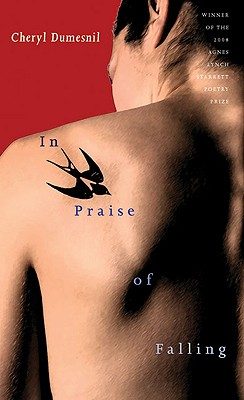Dumesnil shares how passion and persistence made “In Praise of Falling” possible.
Author Cheryl Dumesnil sure wears a lot of hats. Both a writer and editor who has helped tell the stories of LGBT weddings (Hitched!) and tattooed writers (Dorothy Parker’s Elbow) now flaunts her poetic roots in her first collection of poems, In Praise of Falling.
Dumesnil tells us of her unbridled excitement about this major milestone.
How long have you wanted to put out this collection?
I’ve been dreaming about my first book of poems since I started studying poetry writing as an undergraduate. But I had a lot of work to do. At three different points over the past eight or so years, I entered versions of In Praise of Falling into a battery of contests. It was short-listed as a semifinalist or finalist six times. I started calling it “the bridesmaid” because it was never quite “the one.” Then I got the call from Ed Ochester from University of Pittsburgh Press telling me I’d won the Agnes Lynch Starrett Prize. In the end…it was worth the wait.
Where does inspiration come from for you?
Usually my poems begin with a spark moment of some sort—an image, an idea, a feeling, an event, or a phrase that calls my attention. When I have a moment, I sit with that image and ask myself what it’s about, why it’s calling me, what it’s trying to say. The poem comes from there.
What do you believe makes your style and voice distinctive?
Most of my poems rely on narrative as an organizing principle—they have little stories or fragments of stories nestled in them. But if you read them out loud you’ll hear music in them too. I love the musicality of language—the rhythms, the sounds words make, the way each syllable plays like a note in a song. I also like to play with concrete imagery, to get my readers’ senses involved in the experience of the poem.
What kind of glimpses into your life can readers expect from In Praise?
In the poem “The Story Teller’s Daughter” the narrator learns from her father that “It’s okay to bend facts for the sake of the story.” I build my poems with that credo in mind. They are equally full of fact and fiction, so the details of the poems aren’t necessarily autobiographically sound. What the poems will reveal about my life are the themes that obsess me: looking for the spark of beauty in the middle of all the ugly, honoring strength of spirit, longing for authentic connection with others, wondering what keeps relationships alive and what causes them to break.
Is there anything else you would like to share about your book?
I’d tell other struggling writers out there to read this book as evidence that persistence pays off. It’s amazing what happens when you decide that giving up is not an option.
